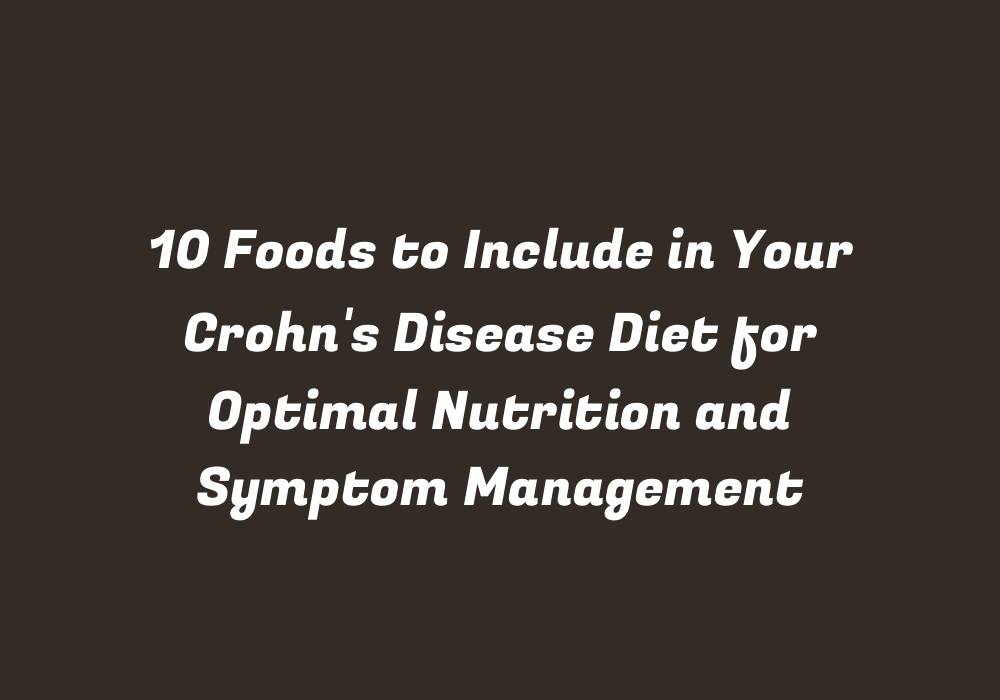Introduction: Understanding Crohn’s Disease and Its Dietary Impacts
Crohn’s disease is a chronic inflammatory bowel condition that affects the gastrointestinal tract. It can cause severe discomfort and disrupt daily life, often requiring proper nutrition management. An essential part of managing this disease includes making healthy dietary choices to minimize symptoms while also ensuring optimal nutrition intake for overall well-being. This article highlights 10 foods you should include in your Crohn’s disease diet for better symptom control and improved nutritional status.
1. Whole Grains
Whole grains, including brown rice, quinoa, oats, and barley, are an excellent source of fiber, vitamins, minerals, and antioxidants. Fiber is crucial for regulating bowel movements and preventing constipation, a common symptom in Crohn’s patients. It is important to avoid processed grains like white bread, which can aggravate the condition due to their low nutrient content and potential gluten issues.
2. Leafy Greens
Leafy greens such as spinach, kale, and arugula are not only rich in essential vitamins and minerals but also provide significant fiber content to help regulate bowel movements. These vegetables can be easily incorporated into various meals by adding them to salads, smoothies, soups, or stir-fries.
3. Lean Protein
Protein is essential for overall health and the repair of damaged tissues. However, it is vital to choose leaner sources of protein to reduce potential irritation in the GI tract. Some good options include skinless chicken breasts or thighs, fish (particularly salmon), and beans like lentils, chickpeas, and soybeans. These foods also provide additional nutrients and are typically well-tolerated by individuals with Crohn’s disease.
4. Healthy Fats
Healthy fats like monounsaturated and polyunsaturated fats found in olive oil, avocados, nuts, seeds, and fatty fish can help regulate inflammation and promote bowel health. Additionally, these fats provide energy for the body while being easier to digest than some other foods. Incorporating healthy fats into your Crohn’s diet can aid in symptom management and overall well-being.
5. Fruits
Fruits are an essential component of any diet due to their abundant vitamins, minerals, antioxidants, and fiber content. They are low in fat and high in natural sugars, making them easily digestible for those with Crohn’s disease. Fruits such as apples, berries, bananas, pears, and melons provide a range of beneficial nutrients while helping to maintain regular bowel movements.
6. Sugary Snacks in Moderation
Although sugary snacks should be consumed in moderation due to their high calorie and low-nutrient content, they can still play a role in your Crohn’s disease diet by satisfying cravings. Opt for healthier sweet options like fresh or dried fruit, dark chocolate, and natural honey instead of processed sugar-loaded treats that may aggravate symptoms.
7. Probiotic Foods
Probiotics are beneficial bacteria that contribute to gut health by aiding in the digestion process and supporting the immune system. Incorporating fermented foods such as yogurt, kefir, miso, kimchi, sauerkraut, or tempeh into your Crohn’s diet can improve overall gut health and potentially alleviate symptoms.
8. Herbal Teas
Herbal teas are a great alternative to caffeinated beverages like coffee, which may exacerbate Crohn’s symptoms due to their stimulating effects on the GI tract. Opt for herbal teas made from ingredients such as chamomile, ginger, or peppermint, which have soothing properties that can help reduce inflammation and relieve digestive issues.
9. Foods to Avoid
While it is essential to focus on the inclusion of healthy foods in your Crohn’s disease diet, there are some food groups to avoid or minimize due to their potential to aggravate symptoms. These include high-fat and fried foods, dairy products (if lactose intolerant), processed carbohydrates like white bread and pastries, alcohol, raw vegetables in large quantities, and spicy dishes.
10. Personalized Dietary Guidance
Remember that managing a Crohn’s disease diet involves personalized guidance based on your specific condition, medical history, and food sensitivities. Consult with a registered dietitian or a healthcare professional to create an optimal nutrition plan tailored to your individual needs.
In conclusion, focusing on whole foods rich in essential vitamins, minerals, fiber, healthy fats, and proteins while avoiding certain irritants can help manage Crohn’s disease symptoms and improve overall nutritional status. By incorporating these 10 dietary recommendations and seeking professional advice, you can successfully navigate your journey towards better health and well-being.
